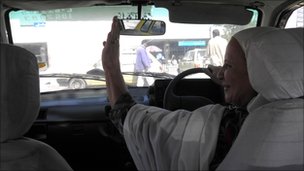 |
| The roads in the northern areas of Pakistan can be perilous |
Zahida Kazmi has been hailed as Pakistan's first female taxi driver. She has driven from the crowded markets of Islamabad to the remote tribal country in the north. Here she tells Nosheen Abbas about her two decades in a male-dominated world.
In 1992 at the age of 33, newly widowed Zahida Kazmi decided to take her fate in her own hands and become a taxi driver.Born into a conservative and patriarchal Pakistani family, she flew in the face of her family's wishes but with six children to support, she felt she had no choice.
She took advantage of a government scheme in which anybody could buy a brand new taxi in affordable instalments. She bought herself a yellow cab and drove to Islamabad airport every morning to pick up passengers.
In a perilous and unpredictable world, Zahida at first kept a gun in the car for her own protection and she even started off by driving her passengers around wearing a burqa, a garment that covers the entire body.
Her initial fears soon dissipated."I realised that I would scare passengers away," she said. "So then I only wore a hijab [head covering]. Eventually I stopped covering my head because I got older and was well-established by then."
Exposing herself to the hot, bustling city streets of Islamabad and by driving to the rocky and remote districts adjoining Pakistan's tribal areas, Zahida says she learned a lot about the country she lived in and its people.
The Pathans of the tribal north-west, despite a reputation for fierce male pride and inflexibility, treated her with immense courtesy on her journeys.
Eventually she became the chairperson of Pakistan's yellow cab association. Once she was established, she offered to teach young women how to drive taxis, but there was little interest. Even her daughters didn't express enthusiasm.
 |
| Passengers say they feel secure with her |
"They don't need to make a living," she says wistfully. "They are all married."
Zahida is not one of Pakistan's metropolitan liberal middle class - there are plenty of educational and career opportunities for privileged women in Pakistan but not for women from Zahida's background. Pakistan has an exceptionally low number of women in work: 33.7% according to the Sustainable Development Policy Institute. Most women who work come under the category of "unpaid family workers".
Pakistan's legal system does little to protect women, so harassment is commonplace. Campaigners say it is little wonder that women do not choose livelihoods that make them even more vulnerable.
"Girls shy away from non-traditional jobs in a setting where there is a particular mindset... of intimidation," says Anees Haroon, chairperson of the National Commission on the Status of Women in Pakistan.
'Curious and amazed' But had Zahida been starting out now, things would be quite different as she would be entering the workforce in a country torn between the forces of liberalism and Islamic radicalism.
Pakistan in 1992 was a more moderate place: it was opening up to the world; the dish antenna had been introduced; Pakistan had won the cricket world cup. Zahida says society felt fairly open to her.
But the Taliban presence in many parts of Pakistan has intensified over the years.
 |
| The roads in the northern areas of Pakistan can be perilous |
Zahida has had to drive long distances on treacherous routes to northern areas such as Balakot, Chitral, Dir and even the Swat valley.
"Police at checkposts would be interested in why I was driving a taxi, but they were simply curious and amazed," she said.Passengers seek her out as well. Adnan Waseem, a businessman from Haripur, told me that he always books Zahida for his journeys.
"I saw her and the first thought that came to my mind was that she's my mother's age. I liked her driving and in these days where one feels insecure in Pakistan I felt very relaxed," he said.
Another traveller, Sohail Mazhar, had to be driven through rocky terrain up to the northern city of Abbottabad.
"I am old now and I get tired. It's hard for me to drive all the time but what can I do? ” Zahida Kazmi
"Even the policemen who stopped us at security checkpoints also knew her... we were so happy to see a woman driving a taxi."
Although Zahida has been feted for being Pakistan's first female taxi-driver, she still has many bitter memories of her struggles as a single mother working hard on the road.Her own mother disapproved of her career choice and only resentfully accepted it when the media gave her positive coverage.
And she is estranged from her children now.
"I am old now and I get tired. It's hard for me to drive all the time but what can I do? My sons don't help," she said.
"If I had a chance I would have become a doctor."
Just as she said that to me, a passing taxi driver stopped his car and got out to reverentially greet Zahida.
Despite her travails, she is clearly a respected presence on the streets of Islamabad.
From: BBC


 12:18 PM
12:18 PM
 Trung
Trung

 Posted in:
Posted in:
0 comments:
Post a Comment